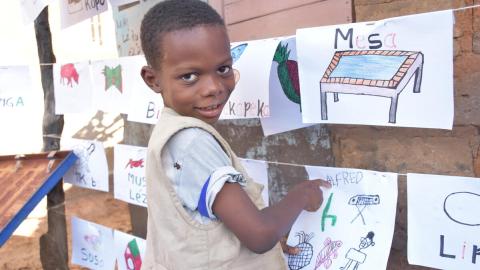
Education
Our Goal:
We want all children in the Democratic Republic of Congo (DRC) to have the opportunity to receive a quality education. We are working to achieve this by:
- Increasing children's access to formal and non-formal education opportunities
- Ensuring that children who attend school learn in a safe and secure environment.
What is the problem?
Access to education for children in the DRC is limited by a number of challenges, including in a public education system which dominated by increasingly ageing teaching staff caused by high teacher turnover. Other challenges include:
- The lack of in-service training, the demotivation of teaching staff
- Inadequate school infrastructure and a lack of teaching materials
With various insufficiencies noted, promoters of public schools have sought to invest in the sector of education in order to fill the vacuum left by the state. To date, 65% of primary schools are under private management. The way they are managed based on the payment of school fees, preventing many children from accessing school, despite the fact that the Congolese state guarantees free education.
It should also be noted that kindergarten has so far aroused interest among parents; this is illustrated by the rate of 79% of children enrolled in 2020. Although 80% of children between 6 and 11 years of age report going to school, only 57% complete their primary education; less than 1% of children live in households with at least three reading books. It is also worth noting that while eight out of 10 children are enrolled in school under free basic education, two out of 10 have dropped out because their parents cannot afford to pay the school fees.
How is World Vision addressing the issues?
We are working with partners including the DRC Government to close the education gap by:
- Building and rehabilitating school infrastructure to the appropriate standards, and equipping schools with furniture
- Facilitating access to drinking water with the construction of water points
- Sensitising communities on the importance of education, and facilitating the promotion of parent-teacher associations to advocate for the education of their children
- Providing teaching materials so that schools have the tools they need to make learning interesting and engaging
- Training teachers in modern teaching techniques, with a particular focus on the five reading skills
- Creating spaces for the promotion of community literacy and the production of different reading learning tools (books in children's mother tongues to make reading fun)
- Helping parents to earn more income through savings groups, so that they can meet the socio-economic needs of their children
- Working in unstable areas such as Kasai and in the east of the country to repair damage to schools, train teachers in peace-building and conflict resolution activities, and provide psychosocial support to children.
Is what World Vision is doing working?
Yes, more children are completing primary school and more children are learning to read with understanding.
Is what World Vision doing working?
Yes, more children are completing primary school and more children are learning to read with understanding.
What’s the impact?
- 57,500 locally relevant and developmentally appropriate reading materials developed and distributed in 2020
- Increase in primary school completion rate, from 67% in 2018 to 83.6% in 2020
- Increase in the proportion of children reading with comprehension, from 16% to 87% in 2020 for grade six
- Proportion of children having completed six years of basic education in an educational institution: 83% in 2020
- Proportion of children attending at least one year of quality pre-primary education: 88% by 2020
- Proportion of children with life skills who are protected from abuse, exploitation and neglect: 96%.
- Proportion of young people who have a learning opportunity that leads to a productive life 81.4%
Related Resources:
- See how we are supporting the psychological and emotional health as well as meeting the educational needs of children affected by violence in the DRC through our Child-Friendly Spaces.
- How hot and healthy meals are encouraging children in the DRC to continue their education.